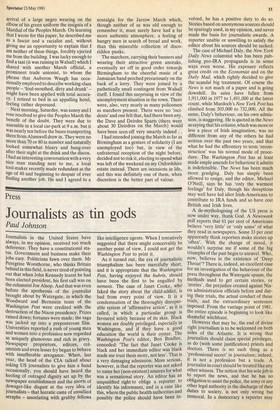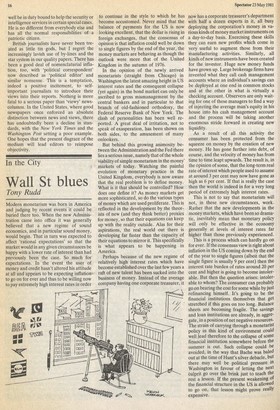Press
Journalists as tin gods
Paul Johnson
Journalists in the United States have always, in my opinion, received too much deference. They have a constitutional status. Government and business make their jobs easy. Politicians fawn over them. Mr Peregrine Worsthorne, who thinks Britain behind in this field, is never tired of pointing out that when John Kennedy learnt he had been elected president, his first call was on the columnist Joe Alsop. And that was even before the apotheosis of the journalist brought about by Watergate, in which the Woodward and Bernstein team of the Washington Post were credited with the destruction of the Nixon presidency. Prizes rained down; fortunes were made; the saga was jacked up into a preposterous film. Universities reported a rush of young men and women into a profession now regarded as uniquely glamorous and rich in gravy. Newspaper proprietors, editors, columnists and even lesser fry began to behave with insufferable arrogance. When, last year, the head of the CIA talked about asking US journalists to give him a hand occasionally, you should have heard the keeling of outraged dignity set up by the newspaper establishment and the snorts of dowager-like disgust at the very idea of journalists — that hieratic caste of unsullied seraphs — associating with grubby fellows like intelligence agents. When I tentatively suggested that there might conceivably be another point of view, I could not get the Washington Post to print it. As it turned out, the era of journalistic triumphalism has been mercifully short, and it is appropriate that the Washington Post, having enjoyed the hubris, should have been the first to be engulfed by nemesis. The case of Janet Cooke, who faked the story about the child-addict, is bad from every point of view. It is a condemnation of the thoroughly disreputable system of 'affirmative action', as it is called, in which a particular group is favoured solely because of its skin. Black women are doubly privileged, especially in Washington, and if they have a good education the world is their oyster. The Washington Post's editor, Ben Bradlee, conceded: 'The fact that Janet Cooke is black and her immediate editor was black made me trust them more, not less'. That is a very damaging admission. More serious, however, is that the reporter was not asked to name her (non-existent) sources for what was a sensational story. An editor has an unqualified right to oblige a reporter to identify his informants, and in a case like this, where the public health authorities and possibly the police should have been in volved, he has a positive duty to do so. Stories based on anonymous sources should be sparingly used, in my opinion, and never made the basis for journalistic awards. A reporter unable or unwilling to satisfy the editor about his sources should be sacked.
The case of Michael Daly, the New York Daily News columnist who has been publishing pro-IRA propaganda is in some ways even worse. His exposure reflects great credit on the Economist and on the Daily Mail, which rightly decided to give the scandal big treatment. Of course the News is not much of a paper and is going downhill. Its sales have fallen from 1,911,000 in 1977 to 1,491,000 at the latest count, while Murdoch's New York Post has climbed from 503,000 to 732,000. All the same, Daly's behaviour, on his own admission, is staggering. He is quoted in the News as saying that his column ,which was more or less a piece of Irish imagination, was no different from any of the others he had written over the past two years, and that what he had the affrontery to term 'reconstruction' was his normal mode of procedure. The Washington Post has at least made ample amends for behaviour it admits is indefensible. The News has been much more grudging. Daly has simply been allowed to resign, and the editor, Michael O'Neill, says he has 'only the warmest feelings' for Daly, though his deceptions may well have led idiot Irish-Americans to contribute to IRA funds and so have cost British and Irish lives.
A de-mythologising of the US press is now under way, thank God. A Newsweek poll reports that 61 per cent of Americans believe 'very little' or 'only some' of what they read in newspapers. Some 33 per cent apparently think reporters make stories up 'often'. With the change of mood, it wouldn't surprise me if some of the big triumphs of the past begin to unravel. Who, now, believes in the existence of 'Deep Throat'? There is, indeed, an excellent case for an investigation of the behaviour of the press throughout the Watergate spasm, the methods used to get certain stories, or 'stories', the prejudice created against Nixon administration officials before and during their trials, the actual conduct of these trials, and the extraordinary sentences Imposed. From the vantage point of 1981, the entire episode is beginning to look like shameful witchhunt.
However that may be, the end of divine right journalism is to be welcomed on both sides of the Atlantic. It is wrong that journalists should claim special privileges, as do (with some justification) priests and doctors. There is no such thing as a 'professional secret' in journalism; indeed, it is not a profession but a trade. A Journalist in court should be treated like any other witness. The notion that his sole job is to report the news, and that he has no obligation to assist the police, the army or any other legal authority in the discharge of their duties to society, is not only wrong but immoral. In a democracy a reporter may well be in duty bound to help the security or intelligence services in certain special cases. He is no different from everybody else and has all the normal responsibilities of a patriotic citizen.
British journalists have never been treated as little tin gods, but I regret the increasingly lavish use of by-lines and the star system in our quality papers. There has been a good deal of nomenclaturial inflation, too, with 'political correspondent' now described as 'political editor' and similar nonsense. This is a temptation, indeed a positive incitement, to selfimportant journalists to introduce their views into their reports. Nothing is more fatal to a serious paper than `viewy' newscolumns. In the United States, where good newspapers once enforced an absolute distinction between news and views, there has undoubtedly been a decline in standards, with the New York Times and the Washington Post setting a poor example. One hopes that the present disgrace of the medium will lead editors to reimpose objectivity.











































 Previous page
Previous page